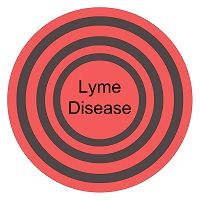Lyme Disease’s Scary Connection with Hepatitis


Lyme disease, an illness caused by the bacteria Borrelia burgdorferi, can be acquired after being bitten by an infected tick. Hepatitis is inflammation of the liver, a condition that can have many different causes, such as alcoholism, a virus or autoimmune disease. Although Lyme and hepatitis seem to be entirely different health conditions, researchers are finding an insidious link between the two – particularly for those already living with chronic hepatitis.
Hepatitis
Describing inflammation of the liver, hepatitis is most commonly caused by a viral infection – like Hepatitis A, Hepatitis B or Hepatitis C. Other causes include:
- autoimmune hepatitis, a disease occurring when the body makes antibodies that damage liver cells
- medications, drugs, toxins or alcohol that cause inflammation in the liver
According to the Centers for Disease Control and Prevention, there are 4.4 million Americans living with chronic hepatitis, and many more are unaware that they have it. While some forms are preventable, treatment options vary depending on what form of hepatitis is diagnosed, and what caused it. If hepatitis becomes chronic, advanced liver disease can occur. Advanced liver disease is likely to cause permanent liver damage and may even lead to liver cancer or liver failure. In addition, those with one form of hepatitis are vulnerable to other sources of hepatitis. If more than one type of hepatitis co-exist, the rate of progression and severity of disease is accelerated.
Lyme Disease Phases
Lyme disease is not genetic, is not spread between people nor is it acquired from drugs or alcohol. Instead, this tick-borne illness only begins after being bitten by an infected tick.
Lyme disease progresses in three phases – affecting different areas of the body as the illness advances.
- Early phase – Beginning at the site of the tick bite, the first phase starts where the bacteria enter the body through the skin. Symptoms may include an expanding, circular, red rash and flu-like symptoms with or without rash including fatigue, headache, stiff neck, fever, chills, muscle and joint pain and swollen lymph nodes. In some cases, there are no noticeable symptoms in this early phase.
- Early disseminated infection – If not diagnosed and treated in the early phase, infection over the next few weeks to months can progress and affect the skin, joints, nervous system and heart. Symptoms in this second phase may include an expanding rash at the bite site; additional rash locations; pain, weakness, or numbness in the arms or legs; paralysis of facial muscles; continuance of headaches or fainting; poor memory and difficulty concentrating, conjunctivitis or eye tissue damage; brief episodes of joint pain, redness and swelling (especially the knee); palpitations or heart problems.
- Late disease – If not effectively treated, damage to the joints, nerves and brain may develop months to years after becoming infected with Lyme disease. The last and most serious stage of the disease, late stage symptoms may include arthritis – usually the knee with redness, swelling and fluid buildup; numbness and tingling in the feet, hands or back; extreme fatigue; difficulty controlling facial muscles – including difficulty speaking; problems with memory, mood or sleep; and heart problems – including pericarditis.
Hepatitis-Lyme Link
A little-known, dirty secret of Borrelia burgdorferi, persistent infection with Lyme disease may also cause hepatitis. The second and third phases of Lyme are usually associated with problems in the skin, joint, heart and nervous system. However, experts reporting on several case studies have observed that another sequela of later stage Lyme disease includes liver inflammation. According to Dr. John Bleiweiss, a specialist in Lyme disease, Lyme hepatitis occurs in 15 to 20 percent of patients.
There is no concrete evidence that demonstrates the mechanism behind Lyme hepatitis, but medical researchers have a logical hypothesis. It is known that Borrelia burgdorferi infect various tissues, causing cellular damage, systemic inflammation and confusion in the body’s immune system. As the liver processes toxins circulating through the body in the presence of Lyme disease, the Borrelia burgdorferi bacteria and their waste would add an extra burden to the liver’s regular toxin load. This increase in the toxic load is likely to back up in the liver, leading to localized inflammation. Thus, anyone who already had hepatitis is particularly vulnerable to rapid Lyme disease progression and compounded liver injury.
Although Lyme disease has been diagnosed in almost every state in America, most cases reported to the U.S. Centers for Disease Control and Prevention are in the Northeast and upper Midwest. For those living in areas where Lyme is more prevalent, tick bite prevention is an important aspect of being outdoors. Though, for those living in tick-infested areas that already have some type of chronic hepatitis (alcoholic hepatitis, Hepatitis B or Hepatitis C), preventing tick bites carries a much greater sense of urgency.
Editor’s Note:
There is an effective tick repellent that is also safe for your liver.
BioShield™ is an all-natural, highly effective tick repellent that is not toxic to your liver. It contains a combination of potent and carefully selected natural essential oils that protect you while killing ticks, mosquitoes, fleas and bugs – preventing them from biting you. All these insects produce a neurotransmitter called octopamine that can be blocked with these non-toxic oils. These natural essential oils block octopamine, which shuts down the insect’s central nervous system, killing it instantly. BioShield™ is safe around children and pets.
Protect yourself against Lyme disease and enjoy the outdoors again.
Recommended Reading: “Tick Repellent and Lyme Disease Both Stress the Liver“
http://lymediseaseguide.org/lyme-disease-liver-dysfunction-more-common-than-many-doctors-think, Lyme Disease Liver Dysfunction – More Common than Many Doctors Think, L Matthews, Retrieved May 31, 2015, LymeDiseaseGuide.org, 2015.
http://ticks.littlethings.com/powassan-virus-ticks/?utm_medium=fb_share, Ticks Now Carry A Virus More Deadly Than Lyme Disease – Here’s What You Need To Know!, Caitlin E. Harrington, Retrieved May 31, 2015, LittleThings, Inc., 2015.
http://www.cdc.gov/lyme/, Lyme Disease, Retrieved May 31, 2015, US Centers for Disease Control and Prevention, 2015.
http://www.columbia-lyme.org/patients/ld_lyme_symptoms.html, Symptoms and Signs, Retrieved May 31, 2015, Columbia University Medical Center, 2015.
http://www.ehow.com/how-does_5529474_effects-lyme-disease-liver.html, The Effects of Lyme Disease on the Liver, Ruth St. James, Retrieved May 31, 2015, Demand Media, Inc., 2015.
http://www.healthline.com/health/hepatitis#Overview1, Hepatitis, May 31, 2015, Healthline Networks, Inc., 2015.
http://www.hepmag.com/articles/lyme_disease_2501_25844.shtml, Persistent Lyme Disease May Lead to Hepatitis, Retrieved May 31, 2015, Smart & Strong, 2015.
http://www.medicinenet.com/lyme_disease, Lyme Disease, Retrieved May 31, 2015, MedicineNet, Inc, 2015.
http://www.webmd.com/arthritis/tc/stages-of-lyme-disease-topic-overview, Stages of Lyme Disease – Topic Overview, Retrieved May 31, 2015, WebMD, LLC, 2015.








2 Comments
Just wanna express my moment of joy for been cured from the deadly HEPATITIS B..
i have been infected with the Disease over 3 years and already lost hope cos i have already tried so many ANTI VIRAL treatment…. one day while making more research online, i came across a tesimony of a patients Dr Lamano cured from GENITAL HERPES. and i decided to give the said DR a call cos he information was online too..
We both talked and he agreed on helping me out… He prepared the CURE in portion and requires my Home Address for the D.H.L to deliver the medicine to me and i recieved the Portion after 4 Working Days….
The cure was prepared from Herbs and he instructed me on how to take it…
well, henced im cured now i decided to write a review on this so others with similar issues can also give a trial.
his email is lamanospellalter@yahoo.com or call him on +2349054870144
.
is there a way to cure hepathisis b